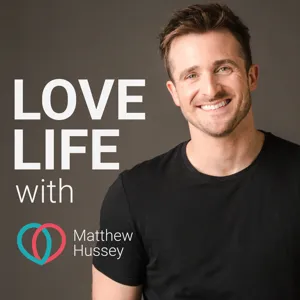Podcast Summary
Chapter 1: Understanding Mate Selection and Attachment: Choosing a mate goes beyond physical attraction, involving deeper factors like attachment styles and histories.
Learning from this episode of The Knowledge Project is that choosing a mate involves more than just physical attraction. While we may be drawn to those we find sexually attractive, there are deeper factors at play. These include our attachment styles and histories. In a conversation with clinical psychologist and couples therapist, Dr. Sue Johnson, Shane explores the question of how we choose a mate and the importance of understanding attachment and bonding in adult romantic relationships. This episode is the first in a series of themed episodes, where FS curates essential segments from past episodes on a specific theme. Stay tuned for more insightful conversations on relationships and other topics. Remember, the goal of The Knowledge Project is to help you master the best of what other people have already figured out, so you can apply these lessons in your own life and business.
Understanding Childhood Attachments and Their Impact on Adult Relationships: Secure childhood attachments provide a foundation for healthy, fulfilling relationships later in life. Recognizing and responding to 'bids' for connection can strengthen bonds.
The quality of our childhood attachments significantly impacts our ability to form healthy and fulfilling relationships later in life. Those who experienced secure attachment with their parents have a distinct advantage, as they develop a visceral understanding of what a good relationship looks and feels like. This knowledge allows them to recognize and pursue relationships that provide safety, respect, and vulnerability. People who did not experience secure attachment may struggle to identify what they're looking for in relationships and may settle for less fulfilling connections. It's essential to understand that we all make "bids" for connection in our relationships, and the key is to learn to recognize when those bids are being reciprocated and when they're not. By tuning in to the subtle cues in our interactions with others, we can increase our chances of forming deep, meaningful connections.
Feeling the connection through emotional attunement: Being present and attuned to each other's emotions is key to building and maintaining meaningful relationships. Start by having open and honest conversations about values, goals, and expectations, and continue to communicate effectively throughout the relationship.
Meaningful connections in relationships come from being present and attuned to each other's emotions. This was exemplified through a woman's tango experience, where she learned to let go of predicting steps and instead feel the momentum and connection with her partner. Those who can tune into the emotional level of relationships are better at seeking out and maintaining secure bonds. Conversations in relationships also evolve with different life stages and stressors, but the foundation of a good relationship lies in emotional responsiveness. New couples should start by having open and honest conversations about their values, goals, and expectations, and continue to communicate effectively throughout their relationship. Esther Perel, a renowned psychotherapist, emphasizes the importance of acknowledging and navigating the tension between the need for security and freedom in relationships.
Communicating and understanding values in relationships: Effective communication and recognizing each other's values are crucial for building and maintaining a healthy relationship. Discussing values openly and respectfully can lead to a deeper understanding and stronger bond.
Effective communication and understanding of values are essential in building and maintaining a healthy and compatible relationship. These values can shape expectations, goals, and decisions regarding various aspects of the relationship, such as living arrangements, family planning, and boundaries. Values can evolve over time, leading to potential conflicts or growth, and it's essential to discuss them openly and respectfully. Couples often discuss these values implicitly, focusing on specific issues, but recognizing and addressing them at a deeper level can lead to a more profound and harmonious understanding of each other. By fostering a culture of open communication and valuing each other's perspectives, couples can navigate the complexities of their relationship and build a strong foundation for a lasting partnership.
Understanding the Dance of Growing Apart in Relationships: Secure relationships allow for differences and enable individuals to feel rooted and free, while high-conflict relationships involve constant blame and defense, and disengaged relationships have little connection. Being secure means experiencing safety, attachment, and nesting, allowing for exploration and return.
Growing apart in relationships isn't necessarily about having differing opinions, but rather how individuals perceive and respond to those differences. Secure relationships allow for differences and enable individuals to feel rooted and free at the same time. The choreography of growing apart can manifest as chronic conflict or disengagement and indifference. In high-conflict relationships, there's a constant blame and defense dance, while in disengaged relationships, individuals live separate lives with little connection. Being secure in a relationship means experiencing safety, attachment, and nesting, allowing individuals to leave and explore their world without worry. The ability to come back to the relationship and find comfort and consolation is crucial for maintaining a secure bond.
The Importance of Connection and Pleasure in Relationships and Sex: Experiencing freedom and connection simultaneously in relationships enhances intimacy, while focusing on pleasure as the measure of sexual well-being leads to a fulfilling and sustainable sex life.
Both Esther Perel and Emily Nagoski emphasize the importance of connection and pleasure in relationships and sex. Perel discusses the significance of experiencing freedom and connection simultaneously in relationships, while Nagoski highlights pleasure as the measure of sexual well-being, emphasizing that it's not about frequency, position, or partners, but rather whether or not one enjoys the sex they are having. Both experts remind us that sex is primarily a social behavior, and the mindset of focusing on connection and pleasure can lead to a fulfilling and sustainable relationship.
Prioritizing Sex and Strong Friendship in Long-Term Relationships: Couples who sustain a strong sexual connection prioritize sex, have a strong friendship, and view it as important for their relationship. Frequent sex is not necessary for a satisfying sex life, and responsive desire is common in long-term relationships. Prioritizing sex and good sleep contribute to a strong sexual connection.
Among couples who sustain a strong sexual connection over multiple decades, they prioritize sex and have a strong friendship with trust at the foundation of their relationship. Contrary to popular belief, frequent sex is not a necessity for a satisfying sex life. Instead, responsive desire, which emerges in response to pleasure, is more common in long-term relationships. Couples who prioritize sex and view it as important for their relationship, make time for it despite their busy schedules and other commitments. Additionally, good sleep is a predictor of sexual frequency and pleasure. The quality of the relationship and friendship between partners is more crucial for a strong sexual connection than the frequency of sex.
Understanding Arousal Patterns: Arousal is personal and can change throughout a relationship. Prioritize and communicate your unique patterns for a healthy sexual connection.
Arousal, like desire, varies greatly from person to person and can be influenced by various factors including physical, mental, emotional, and relational experiences. It's not a one-size-fits-all concept, and what works for one person may not work for another. Moreover, arousal can change throughout the course of a relationship, with some people experiencing increased arousal as they age due to the richness of their shared experiences and memories. Ultimately, it's essential to prioritize and understand your unique arousal patterns and communicate them openly with your partner to foster a healthy and satisfying sexual relationship.
Expanding the definition of sex: Sex goes beyond genital acts and orgasms, encompassing various forms of intimacy and connection. Understanding this can lead to more fulfilling relationships.
Sex is not just limited to genital acts leading to orgasm. The definition of sex can be expanded to include various forms of intimacy and connection. Most people have been taught that sex involves genitals, penetration, and orgasm, but this narrow perspective can limit exploration and enjoyment. The sexual menu concept encourages couples to broaden their definition of sex and experiment with different forms of intimacy. Sex can start with willingness and end in pleasure or satisfaction, which can be emotional or physical. It's essential to recognize that not every sexual encounter needs to include orgasm for both partners and that one partner can pleasure the other. Initiation is not always tied to a specific gender, and the reasons for one partner initiating more often than the other can be cultural, biological, or personal. Expanding our understanding of sex can lead to more fulfilling and satisfying relationships.
Socially constructed dynamics of sexual initiation and desire: Effective communication and challenging societal gender scripts can lead to healthier, more fulfilling relationships, both personally and professionally.
The dynamics of sexual initiation and desire are more socially constructed than biologically determined. While there are hormonal differences between genders, people's preferences and roles in initiating or being receptive can vary greatly. Some people enjoy both roles, while others prefer to take the lead or be more submissive. These roles can be influenced by societal gender scripts, which can be limiting and not work for everyone. Effective communication and sharing secrets with partners can help challenge these scripts and lead to healthier, more fulfilling relationships. Kat Cole, a business leader, shared her personal experience of having monthly check-ins with her husband to maintain open communication and connection in their marriage. These strategies, when applied to personal relationships, can also improve leadership skills and empathy in professional settings.
Monthly check-ins for deeper relationship communication: Prioritize intentional communication in relationships through regular check-ins and thoughtful questions to deepen understanding and strengthen the bond.
Intentionality and communication are key to building a strong and healthy relationship, both personally and professionally. The couple in this discussion recognized that they had not prioritized their roles as partners in their previous relationships and decided to make a change. They implemented a monthly check-in practice, where they ask each other thoughtful questions to go deep and reflect on their relationship. This practice has been an incredible enabler for their relationship, allowing them to communicate more effectively and understand each other's perspectives. The husband also shared an emotional experience where he realized his wife was not recognizing the depth of his grief after a miscarriage, and this led to a more sensitive and probing conversation. By making a conscious effort to communicate and be intentional, the couple has been able to build a stronger and more meaningful relationship.
Pause and Reflect on Moments of Difficulty or New Insights: Taking time to explore challenging situations or new perspectives can lead to profound realizations and a deeper understanding of ourselves and the world around us.
During moments of difficulty or new insights, it's essential to pause and reflect on our experiences. Esther Perel emphasized this during our conversation, sharing that these moments often occur when we're moving quickly through life and don't realize the significance of what we're going through until we slow down and engage in meaningful dialogue. These conversations can lead to profound realizations and a deeper understanding of ourselves and the world around us. The power of these moments should not be underestimated, and it's crucial to make time for them in our busy lives. So, next time you encounter a challenging situation or have a new perspective, consider taking a break to explore it further – you might be surprised by what you discover.





